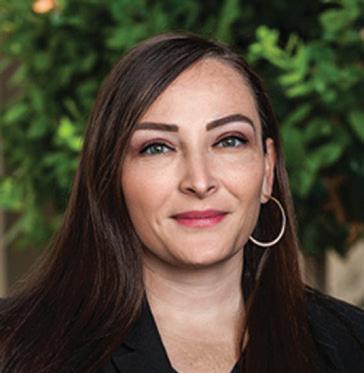SENIOR LIVING











Medical advancements and better lifestyle choices can help you stay happy and healthier late in life.
The percentage of Americans who are 65 and older has never been higher. About one in every eight U.S. citizens fits into this age demographic, according to the Administration on Aging. That number is expected to rise from some 13% of the population to 19% by the year 2030 as the Baby Boomer genera tion continues to move into retirement.
Life expectancy rates have been hov ering around all-time highs for years, meaning the so-called “golden years” have never been more exciting. Choices made as we age can ensure that you join this growing segment.

Important health breakthroughs are key elements in the rise of life expectan cy prior to COVID, according to the Centers for Disease Control and Prevention. The health care field’s ability to control infection, combat chronic dis ease, treat previously fatal maladies and vaccinate against many serious viruses has led to a notable decline in deaths everywhere. We understand more about the ways heart disease, poor diet and lack of physical activity combine to shorten our lives, and healthier living and prescription aids have bolstered life expectancy. Safety improvements in the workplace, on our highways, and with our water and food have also helped.
So how do you meet and then beat the life expectancy average? Seniors with diets that are high in vegetables and



fruits, and low in fatty meats and pro cessed foods are living engaged, satisfy ing lives into the 80s, 90s and beyond. Being highly social plays a role too, whether that means spending time with friends and family, or getting involved with community groups, municipal events or hobby groups. All of it can work in concert to bolster your health and your emotional well being.
Even though Americans have gener ally been living longer, the Journal of the American Medical Association has noted that some still struggle with quali ty of life. Whether that’s because of lone liness, depression, or nagging maladies like arthritis, growing older doesn’t always mean remaining happy. Healthier diets, regular exercise and a renewed focus on social interactivity is recom mended. But if you’re still struggling with a sense of well being, don’t be afraid to reach out to friends, family, medical professionals or counselors about your situation.
Americans who are 65 and older are moving into a period where they’ll be on a fixed income. Make sure you’re ready.
Retirement can be one of the most rewarding and enjoyable parts of life, as long as you have your health and the means to live comfortably. Should a medi cal issue arise, it will be all the more important that you’re prepared to with stand whatever financial implications are involved.

Outliving your carefully constructed nest egg, or encountering some unexpect
ed complication that drains your savings could have a catastrophic impact on your retirement years. Preparing for those situa tions, while also ensuring that you can live your retirement to the fullest, will involve creating a strategy. Consider moving some of your investments into lower-risk bonds and mutual funds, since high-risk options could present a near-term danger to your financial situation.
At the same time, however, don’t go overboard when investing in any one seg ment. The American Association of Retired Persons still recommends main taining a diverse portfolio. Becoming too conservative can have a negative impact on those who live past average life expec tancy. The idea is to only shift a bit toward safer investments. If you’re unsure how to make this delicate balance work, contact a
reputable financial advisor to help devise an approach that works for you.
In some cases, it may not be financially possible to retire as the traditional age of 65. For others, continuing to work may help ease worries about outliving your nest egg. In some cases, including Social Security and pension plans, there are spe cific financial incentives for continuing to work. Changes in your field, interest rates or inflation-related pricing may also be a factor in your decision. Just remember to continue to contribute to your retirement plan as you go.
Federal and state government agencies offer a range of benefits for older

Americans, all of which can help build savings for the future. Look into propertytax relief and energy-assistance programs to save money in immediate billing cycles. They’ll have local representatives who can tell you more about your eligibility and options. Take advantage of every-day dis counts that are made available to seniors, from your local grocer to national parks.
Consider downsizing to save on rent and utilities.
Valley Oak Dental Group is a multispecialty group practice committed to excellence.


Our Pediatric Department provides a comfortable, caring atmosphere for your children.
We provide the latest General Dentistry procedures in a state-of-the-art dental suite.
Our Oral Surgery Department provides general anesthesia and I.V. sedation in a safe, professional environment.
Dr. Bonnie Morehead Dr. Ron Joseph Dr. Rudy Ciccarelli Dr. Elizabeth Grecco Oral & Maxillofacial Surgery Dr. Mark Grecco
823-9341
Sometimes wellness comes down to leaving a sedentary lifestyle behind. Here’s how to get moving, and get healthy.
The first step is to discuss your plans with a doctor, in particular if you have health issues like heart disease, diabetes or obesity. A medical professional can help you better understand which activi ties and exercises are best suited for your personal goals, while also taking into account the unique challenges you’ll face — in particular when you’re just getting started.
Once you’ve determined a course of action, it’s important not to do too much in your initial exercise sessions. This is especially important to remember if you have never been particularly active. Begin with an achievable goal of two or three hours of only moderate activity over the course of a week. Take time to see how your body is reacting to this new regimen, and how best to fit regular exercise into your average weekly sched ule. Slowly add more reps, more miles or more time as your body continues to adjust.
Remember, any activity that gets your heart rate going is considered exercise. So you don’t have to jog or lift weights in order to get needed health benefits. In fact, you don’t need a gym or healthclub membership at all. When you’re walking fast, doing household chores,

dancing, or even doing every-day lawn work, you are participating in a form of exercise. Activities like yoga and balance exercises can be done in the comfort of your own living room. Play games out side with your grandchildren, or join them at the local swimming pool.
The Centers for Disease Control and Prevention recommends 30 minutes per day of moderate exercise, including activity like walking briskly. Vigorous exercise like jogging, hiking and run ning should be done for 75 minutes a week. Remember to take time at least twice a week to take part in musclestrengthening exercises, as recommend ed by health.gov. If you don’t have weights or resistance bands, try using bottles of water or other heavier house hold items. Take an immediate break and consult your doctor should you start to feel chest pains, shortness of breath or other nagging physical issues.
Bethany Home is dedicated to providing a safe, familiar home setting that is comforting and supporting to people who have problems with memory and orientation. With a specially trained team of compassionate and dedicated experts, we’re able to enhance the lives of those living with dementia or Alzheimer’s while ensuring their safety, health, comfort, and security.

These dietary extras come with the promise of better health, and sometimes even the treatment or prevention of dis ease.
Unlike prescription drugs, however, they don’t go through the same rigorous testing — so they haven’t always been proven effective. That’s why it’s impor tant to talk to you doctor before adding dietary supplements.

Here’s what to consider before adding another pill regimen:
Dietary supplements come in an array of forms, including capsules, pills, liquids and powders. They may make
health promises based on providing additional vitamins, fiber, herbs, miner als, amino acids and other supposedly curative ingredients. However, the Centers for Disease Control and Prevention consistently warns users that they have been been approved to treat or prevent illnesses. Instead, supplements like calcium and vitamin D can help keep your bones strong. Vitamin B6 is required to create red blood cells, while Vitamin B12 aids in keeping your nerves healthy. Some seniors have more trouble absorbing vitamin B12, and vegetarians are more at risk of deficiency because natural sources for this vitamin are found in animal foods.
The biggest worry with unprescribed supplements, in particular for older con sumers, is the unexpected ways that they
may interact with the medicines you’re already taking. Consult with your doctor before adding any over-the-counter sup plements to make sure that you’re not ingesting something that doesn’t mix well with the prescriptions which are already in place. There are also dangers associated with taking too much of a certain vitamin or mineral that you may be unaware of, in particular if you are dealing with pre-existing health prob lems. Supplements might interfere with one another, too.
Your health-care provider can best discuss the pros and cons of dietary sup plements with an eye on your unique health situation. These talks are particu larly important if you have a planned surgery. You may be instructed to dis continue taking some supplements for

two or three weeks prior to having the procedure. Develop a personalized plan with your doctor or nurse, taking in to account your age, other drugs and health status. Then return regularly so that your responses can be monitored over a course of weeks or months.





















These scams come in all shapes and sizes, from shady phone calls and phish ing expeditions to fraud committed as we grieve a loved one.
The key advice, according to the National Council on Aging, is to remain aware. If something feels off or out of the ordinary, or if you just feel unsure, don’t be afraid to make the right deci sion for your own financial wellbeing. Contact the proper authorities, and take whatever precautions are recommended to protect yourself and your nest egg.
The National Council on Aging warns seniors to remain vigilant when it comes to criminals posing as a represen tative from Medicare. This is one of the widest-spread scams, since everyone over the age of 65 qualifies. These con artists are usually looking to steal your personal information under the guise of correcting some issue with your cover age. They’ll then use these details to take part in more online fraud. Don’t share your personal information without first confirming that you are connected with a legitimate representative.
One of the easiest ways to find your self on the wrong end of a scam is giving someone bank or other sensitive infor mation over the internet. Be extremely cautious when opening an email, click ing on links or downloading anything –even if it appears to be from a trusted source. The easiest fail-safe option to protect yourself is to closely examine the

return email address. If it looks suspi cious, it probably is.
Taking advantage of someone in their time of loss, these scammers follow obit uary notices and then contact senior rel atives in order to extort money for fake debts. Never trust someone who calls or appears without warning when there isn’t a previously existing paper trail.

Counterfeit drug operations have become a growing problem as more and more seniors buy on the internet in order to take advantage of specialized pricing. Online scammers are stealing large sums of money from unsuspecting seniors, who are then left with either no prescriptions or fraudulent drugs that are useless — or even quite dangerous. Copy-cat pills may be in the wrong dos age or include dangerous additional ingredients. Ask your doctor to help with navigating to safe sites.
The shining lights on a Christmas tree are meant to brighten the darkest season, but Hospice of San Joaquin has adopted the holiday tradition to mean so much more.



For the past 34 years, the organiza tion has been lighting up trees across the Valley in remembrance. Every light on the trees represents the life of a loved one.
Tree of Lights provides an oppor tunity tO gather as a community while celebrating the blessings of the lives who have touched their hearts.

The Tree of Lights program helps those left behind transition from grief and sorrow to remem brance and honoring.

The lighting ceremonies have be come a local tradition for both the community and individual families beyond offering an opportunity for community members to gather and reflect.
The holidays are a hectic time, but Tree of Lights offers an avenue to pause and
reflect and share in the strength of a community.
Community members are invited to dedicate a light to remember or honor a loved one by donating to Hospice of San Joaquin.
Ceremonies will be held through out the county.
“Our trees are ‘Trees of Life,’ hon oring the gift of life,” said Hospice of San Joaquin CEO Rebecca Burnett.
“Each tree brings light to the dark night, as do the memories of our loved ones whose light will shine throughout the holiday season.
“We are thankful to PG&E who has, from inception,provided employee volunteers and funded grants for tree set up and mainte nance.”
For more information, visit hos picesj.org or call 209-957-3888.









You need this down time to rest and recharge, but sleeping also has a positive impact on your brain and emotions.

Rest helps build a reserve of needed strength and calmness when we suffer tiredness, overexertion or a bout of ill ness. Our immune systems are particu larly vulnerable to lack of sleep, meaning you have fewer defenses against disease.
Lack of sleep, or enough sleep, has been connected to inflammation issues, depression, heart disease, anxiety, and difficulty in regulating appetite. Here’s how to get back on track:


Between 40 and 70% of seniors suffer from chronic sleep problems, research ers confirm, and as many as half may be undiagnosed. This is a pressing issue, because older adults actually need about the same amount of sleep as those in their 20s. They often get far less because of a variety of issues: Some suffer from insomnia because of health issues or anxiety, while others cite sleep apnea, restless leg syndrome, frequent urination or pain from maladies like arthritis. Medications may sometimes interfere with regular sleep patterns, too. If your meds are to blame, talk to you doctor about adjusting the dose or timing. They may even recommend switching to a different prescription.
quickly, since the initial frustration with tossing and turning can lead an extend ed period of trouble dozing off. Avoid using computers, phones or other elec tronic devices just before bed. Try to develop a relaxing ritual before bed so that you’re in the proper frame of mind. That may include a relaxing bath, read ing a chapter or two of a good book, or listening to calming music or nature sounds. Avoid tobacco or caffeine just before bed, since both tend to energize people rather than help them wind down.
It starts with getting to sleep more
Our night-time sleep cycles aren’t the only time we should rest — and regular intervals of rest during the day can have big health impacts, too. Take a moment or two throughout a busy day to relax. Take a walk or listen to a song or two. Try napping less and exercising more, since both can have a direct impact on getting to sleep — and staying asleep.

“It takes a village.”
It’s a phrase often used when referring to raising children, but having a village is a lifelong need. That village becomes vital once a loved one starts showing signs of cognitive decline or receives a diagnosis of Alzheimer’s disease or dementia.
Keeping that loved one involved and included in conversations is an important way of helping them maintain their rela tionships and sense of belonging.

Here are three ways caregivers and loved ones can help someone living with cognitive decline remain a vital part of conversations and gatherings:
• Minimize distractions
When you’re having a conversation, turn off the TV, radio or any music that may be playing. Allow the focus to be on the conversation.
• Stay upbeat
It can be difficult watching a loved one struggle to remember names or details, but they pick up on any sadness or frus tration through your facial expressions and body language. Always focus on the positive.
• Take a break
If frustration creeps in, change the topic in conversation, or suggest a differ ent activity. You can even just lean in for a hug or take their hand. Even small ges tures can show support.
Our team here at Prestige Assisted Living at Manteca is here to help. At our website, you can download a free guide to cognitive health, which includes infor mation about different stages of memory loss, advice for those living with cognitive decline and their caregivers, cognitive assessments, and much more.
To download our free guide to cognitive health, visit prestigecanhelp.com.
At Prestige Assisted Living at Manteca, cognitive health is a centerpiece of our wellness programs.
For more about our cognitive pro gramming or our community, visit pres tigecare.com/Manteca or call us at (209) 239-4531 to schedule your visit.
If you or a loved one are showing signs of cognitive decline, or have maybe even received a diagnosis of dementia, it’s a new reality that leads to many questions, concerns and fears.
It’s why we’ve created a free guide to cognitive health, available on our website through October. The guide includes valuable information about the different stages of memory loss, advice for those living with cognitive decline and their caregivers, tips on tending to mental health, cognitive assess ments, memory games and much more.
Download the free guide to cognitive health at prestigecanhelp.com . For more about our cognitive programming, call (209) 239-4531.
Prestige Assisted Living at Manteca 1130 Empire Ave. · Manteca, CA 95336 (209) 239-4531 · prestigecare.com/manteca License No.: 397004125
At Prestige Assisted Living at Manteca, we know the uncertainty and anxiety that can come with memory loss.

Seniors must evaluate these purchases on more than its color or stylish design. Whether it’s a worthwhile purchase is based not just on sticker prices and miles per gallon, but also on safety and ease of use. But with the right approach to appraising a vehicle, and a little hands-on evaluation, you can make a choice that’s right for you. Here’s how to find the right new vehicle.




Older drivers must pay particular attention to pricing and length of the loan. The total cost of ownership — which includes not just the price, but also operating costs, maintenance and fuel economy — must be balanced against what is often a fixed income. Make sure your exciting new vehicle doesn’t quickly deplete your nest egg. If money is less of a concern, consider shortening the note so you can own the vehicle outright sooner.

Seat belts and air bags are standard in motor vehicles these days, but are they positioned for your personal comfort?
Test drive the vehicle to make sure that its design and general ergonomics won’t increase driver fatigue, including adjust able seats and pedals. Make sure you can easily enter and exit, and that there’s plenty of leg room. Look for models with larger control buttons and display features, with bright, easily read content.
Consider signing an extended war ranty and maintenance agreement. This
will ensure that older drivers don’t have to worry about becoming stranded, or trying to find specialized mechanics to address the issues that arise with the modern era’s computer-reliant vehicles. Just remember to keep up with the vehi cle’s maintenance schedule, since even a single missed oil change might void your warranty. In the meantime, these regular check ups can help save money with a boost in fuel economy from a better-running machine.
A comprehensive check list for seniors called CarFit has been crafted by the American Society on Aging with help from AARP, the American Occupational Therapy Association and AAA. Included are additional reminders to evaluate steering-wheel tilt, the posi tion of the brake and gas pedals, and any blind spots – in particular for those with neck-mobility issues. Other technical advice can also be found at car-fit. org.











